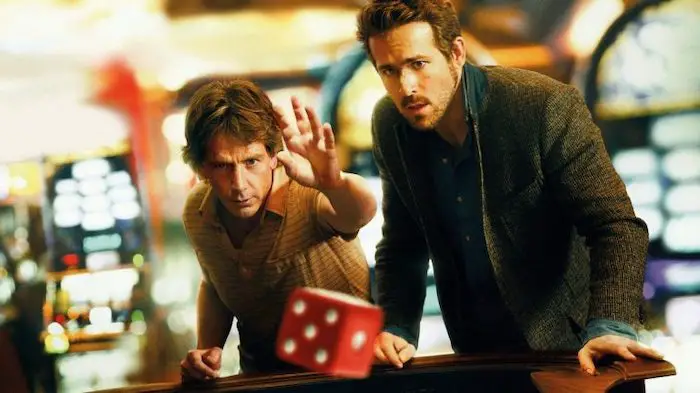
There was no principal backer, no “money man”? ^ RA: Well, my credit cards had higher limits. ^ SL: And I bought all our equipment online. I’m the techie. We realized it made sense to buy everything instead of renting. I bought an old Avid on eBay for like $6,000. We bought PAL DV equipment, cameras, deck; we wanted to bump up to film eventually and needed the extra 100 lines of resolution. We decided to shoot two cameras the entire time and put a wireless Lav mike on Henk. ^ DK: It’s funny, I set up this whole production on the Internet. I don’t think I made one call to Ghana. So when we got off the plane there we were all a bit nervous, because I’d never spoken to an actual person. We had all this expensive equipment, and here we are in a strange land…but at the airport there was some dude standing there holding a sign that said “AMERICAN FILM CREW.” ^ RA: That was excellent. It was like validation – someone besides us was calling us a film crew. Suddenly it all became real.
Give us the time frame – when did you make the trip to Ghana? ^ RA: In June 2000 we all flew to Amsterdam for a week, and then went on to Ghana for six weeks. ^ SL: When we checked in to the hotel in Amsterdam, I called Henk. I asked how he was doing and he said, “Fine” – except for the fact that he was just denied his Visa to travel to Ghana. So I crawled into a fetal position and handed the phone to Rob. ^ DK: We were supposed to be flying to Ghana in a week, but suddenly the whole film was in jeopardy. ^ RA: If you watch the dailies you’ll see that Dave doesn’t crack one smile the entire time we’re in Amsterdam. ^ DK: We all agreed to take a chance and fly to Ghana anyway, with Henk’s wife and son, and just hope for the best.
You flew to Ghana not knowing if Henk was ever going to arrive? ^ DK: Yes, because we were determined as a team to finish what we started. We had faith that sooner or later the Ghanaian Embassy would give him his visa. The problem was that now we were all in Ghana with no Henk, and we hadn’t budgeted enough money to spend that time without him there. This was a documentary; it wasn’t like we had a script to follow.
And the visa controversy was about Henk’s offhand comment in the AP interview? ^ DK: Yeah. This AP writer, Anthony Deutsch, had asked Henk what his reaction was to being named Togbe. And supposedly Henk said, “I thought they must all be insane.” ^ RA: The way I think it happened was that Henk was having a casual conversation with the guy and just sort of tossed that remark off. Deutsch put it in the article verbatim, and it went out everywhere that way. We Westerners get the joke, but to Ghanaians it had a different meaning – it seemed offensive to them. They definitely have their point of view. One guy in the film says something very poignant: “The world has taken everything from us, but they cannot take our culture.” ^ DK: I really don’t think Henk meant to offend anyone. He’s just not that kind of person. He was shocked by the reaction, and you can tell he genuinely regrets saying it. ^ RA: But they could not let it go. Henk got called on the carpet so many times. He was pretty pissed about the whole controversy, but now I think they’ve ironed it all out. ^ SL: Henk was also upset about a Ghanaian newspaper headline, which you can see in the film: “JOBLEss WHITE FLOP MADE REAL KING.” ^ RA: I think the Ghanaian embassy is still out to get him. For some reason they just have it in for Henk. But he’s really just a good guy who has been put in this amazing position, and he’s doing the best he can. And he gets no money for his trouble. ^ DK: Anyway, the embassy did finally give Henk his visa. But just as he arrived in Mepe, I had to fly back to L.A. and get more money. ^ SL: We actually needed someone stateside anyway, because there were too many things coming up that we needed and couldn’t get in Mepe, or anywhere else in Ghana. DV tapes, for one. ^ DK: Rob gave me the key to his storage space and I had a big garage sale. I sold a lot of his crap – maybe too much. ^ RA: Yeah, like my bed! ^ DK: We needed the money! Anyway, I got the cash to wire them, about $3,000. But in Ghanaian currency, 7,000 Cedi equals one U.S. dollar – so the three grand became 18 million Cedi. Rob had to pick up the money at the bank. ^ RA: The largest denomination of money they have is a 5,000 Cedi note. Kwami, our guide, found me two bodyguards and took me to this Western Union-type place. I brought my backpack to put the cash in. They had me wait in this room, this man comes in with a slip of paper, looks at my backpack and tells me it’s not big enough. Then this woman comes in with two Hefty bags, and the man starts stacking all these bills in the two bags. I couldn’t believe it. I got back to the hotel and we all had to hide away these stacks of cash, like a scene out of “Blow.”
Get the rest of the interview in part four of WORKING CLAss KING: THE STORY OF “TOGBE”>>>
